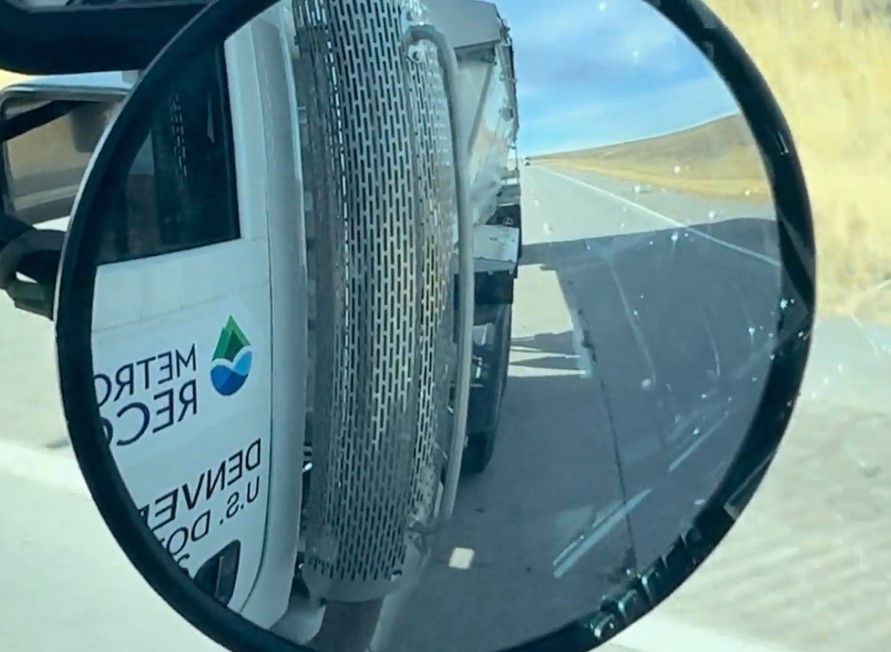
On the Road with METROGRO
The flow to Metro Water Recovery’s facilities never stops, and neither does the need for delivering our class B biosolids to area farm sites.
METROGRO® Cake is the final product of our biosolids dewatering process where solids are recycled and repurposed to be safely used for agricultural land application. Named for the batter-like consistency, the METROGRO® Cake is rich in nutrients that make it a very useful fertilizer for both irrigated and dryland farms. The process of recycling biosolids as farm fertilizer has been utilized for decades, and biosolids are among the materials most regulated and studied by the U.S. Environmental Protection Agency.
A Fleet That Can’t Be Beat
With over 31,000 dry tons of product per year between both of Metro Water Recovery’s treatment plants, multiple trucks are needed to haul the product to these farms. That’s where our METROGRO truck fleet comes in! Metro Water Recovery has a fleet of 18 tractor-trailers; eight to 14 drivers will take multiple loads a day to various farm sites, six days a week. Each load usually weighs at least 40,000 pounds.
“Our cake transport drivers start their shift at either 4:00 or 5:00 a.m., and after a brief meeting and daily safety talk, they begin their day of hauling,” says Jeff Hayden, RR&R Operations Manager.
Depending on the site location, the drivers will make three to four trips, averaging about 450 miles each day. When the drivers finish their final load deliveries, they clean, fuel, and prep their trucks for the following day.
Time to Hit the Road
Each trip begins with load-in at the biosolids dewatering facility. Here the trucks are carefully lined up with chutes that open and fill trailers with our METROGRO® Cake.
“We want to get at least 40,000 pounds” explains driver Todd Bezerra as he watches the controls and his trailer is loaded. Bezerra explains that the total weight including the truck should be between 77,000 and 80,000 pounds.
When the trucks leave the greater Denver area, traffic lightens up and buildings and townhomes are substituted for open fields. “We handle at least 10 farms that I can think of off the top of my head in this area alone,” explains Bezerra. These farms mostly grow wheat and corn.
Upon driving to the designated field, the truck is unloaded. Metro is also responsible for land application, as the biosolids are a heavily regulated product. We send our biosolids to over 300 farm sites throughout the state.
After the delivery is made, the truck heads back to Denver where the emptied truck weight is logged and the process is repeated.
Challenges and Praises
Weather, road, and traffic conditions are the biggest challenges when it comes to delivering METROGRO® Cake. Heavy traffic can drastically increase trip times, and Colorado’s wild winter weather swings can sometimes cut off access to needed routes.
“When weather affects us, we will first try to find an alternative application site to haul to or use one of our permitted biosolids storage areas on the METROGRO Farm,” explains Hayden. The trucks can only travel on certain roads, which makes finding an alternate route sometimes tricky. If adverse weather conditions prevent any of those options, the trucks will store the METROGRO® Cake on-site in a designated storage area.
Each day, the fleet handles one of Metro’s biggest jobs and the crew has a lot to be proud of. For Hayden, that pride comes with an impressive statistic, “in spite of the challenges we face, our team was able to haul 7,726 loads of biosolids and drove a combined 956,520 accident-free miles last year.”
With a strong demand from area farms to use the product, the importance of the fleet’s daily work is a crucial element for the farms throughout Colorado.
